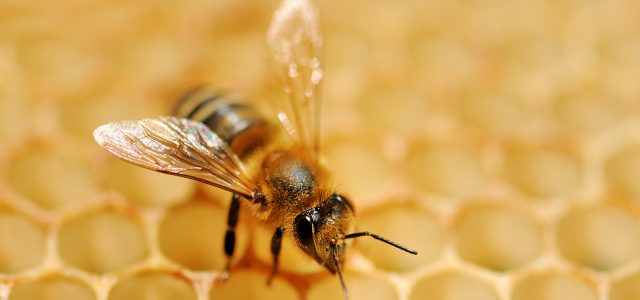
A TASTE OF HONEY…
Featuring near-native black bees that can produce up to 60lbs of raw honey each year, the Bee Centre is a thriving bio-diverse facility for both adults and children to enjoy
Last year experienced beekeeper Kath Cordingley and her husband Simon launched The Bee Centre – a veritable hive of activity that promotes the importance of honeybees to our natural environment and their value to our economy. As part of this they also produce small quantities of high quality honey, the sales from which are reinvested into looking after the bees.
According to Kath: “We don’t actually keep bees to make honey, we keep them to help pollinate plants, to improve biodiversity and to educate people. Our honey is in fact a bonus, albeit a very good one!”
Unlike most beekeepers Kath and Simon leave their bees with plenty of honey to feed on during the winter months – bee keepers often take all the honey and feed the bees sugar during this period.
“Honey is the bees’ natural winter food and they eat a lot of it. While it is much cheaper to feed them sugar, we don’t do that, unless it is an emergency. This also helps to maintain the high quality of our honey,” explains Kath.
Honey is an ancient, natural remedy which has wide-ranging health benefits and can be used to treat hay fever and other allergies, sore throats, skin conditions and cuts and wounds. It is an excellent source of natural sugar and some studies even indicate it can support weight loss and help in managing some forms of diabetes.
The Bee Centre has over 60 hives, each containing around 50,000 bees, at 11 locations throughout Lancashire and North Wales. One of these is a farm where the bees pollinate a rapeseed crop. The farm then cold presses the seed on site to produce oil, which is also bottled on site. The oil has half the saturated fat of olive oil and it is rich in vitamin E and beneficial Omega 3, 6 and 9. It can be heated up to 300 degrees C without smoking, so it can be used to either shallow or deep fry. It can even be used in baking instead of butter.
“When I go to inspect the bees at the farm I pick up the oil so there are hardly any food miles. It is very sustainable, which is what we like,” says Kath.
In October the Bee Centre opened a visitor attraction, located in the grounds of Samlesbury Hall. The collaboration is hugely successful and features a stunning, indoor, glass observation hive where visitors can see thousands of bees up close. The queen makes regular appearances and visitors can even watch baby bees ‘hatching’.
Once worker bees hatch, they never sleep, they work 24 hours a day and die after about six weeks.
There are live talks and demonstrations and visitors can learn exciting facts about bees and how they produce the delicious honey that is used in and sold in the shop. There is even a bee friendly garden featuring wild flowers, herbs and fruit. The centre sells beautiful, locally made, beeswax candles, different types of honey, cut honeycomb, bee related jewellery, rapeseed oil and Kath’s freshly made honey fudge.
Adventurous visitors can book onto a ‘bee experience’ where they will put on a bee suit and accompany Kath as she opens a hive or two. “These are really popular,” says Kath. “Visitors get the full experience of being surrounded by bees and seeing how a hive works.”
The Bee Centre works closely with schools and businesses and they recently launched their ‘swarm cottage’ initiative. These wooden bee houses can be bought or sponsored and provide much needed homes to honeybee swarms. “Over three quarters of swarms die due to lack of suitable places to set up home,” says Kath.
Responsible businesses can also have hives managed on their behalf, either at their own site or on location at Samlesbury Hall. These corporately badged hives help companies to support biodiversity as part of their corporate responsibility programmes.
Couples who are planning a wedding at Samlesbury Hall now have the opportunity to have bee-themed wedding favours as well as sponsored hives for the happy couple.
Anyone interested in learning to keep bees, or improving their beekeeping skills, can attend courses and workshops which are run from the on-site classroom and apiary.
The apiary includes hives of different types so those new to beekeeping can discover which style of hive is best for them.
“Beekeeping is an enjoyable and sustainable activity and it is becoming much more popular, which is lovely, especially when we see how it engages children,” concludes Kath.
The Bee Centre – Samlesbury Hall
Preston New Road
Samlesbury, Preston PR5 0UP
01772 494487
info@thebeecentre.org
www.thebeecentre.org
facebook@thebeecentre
twitter@thebeecentre

